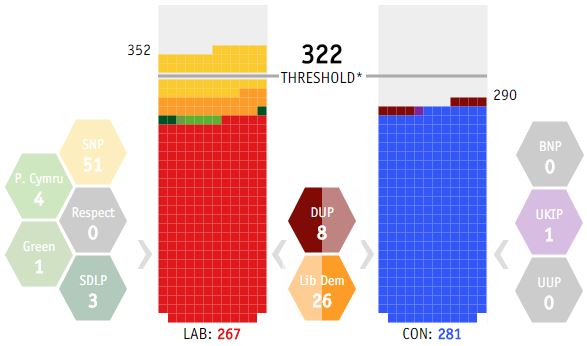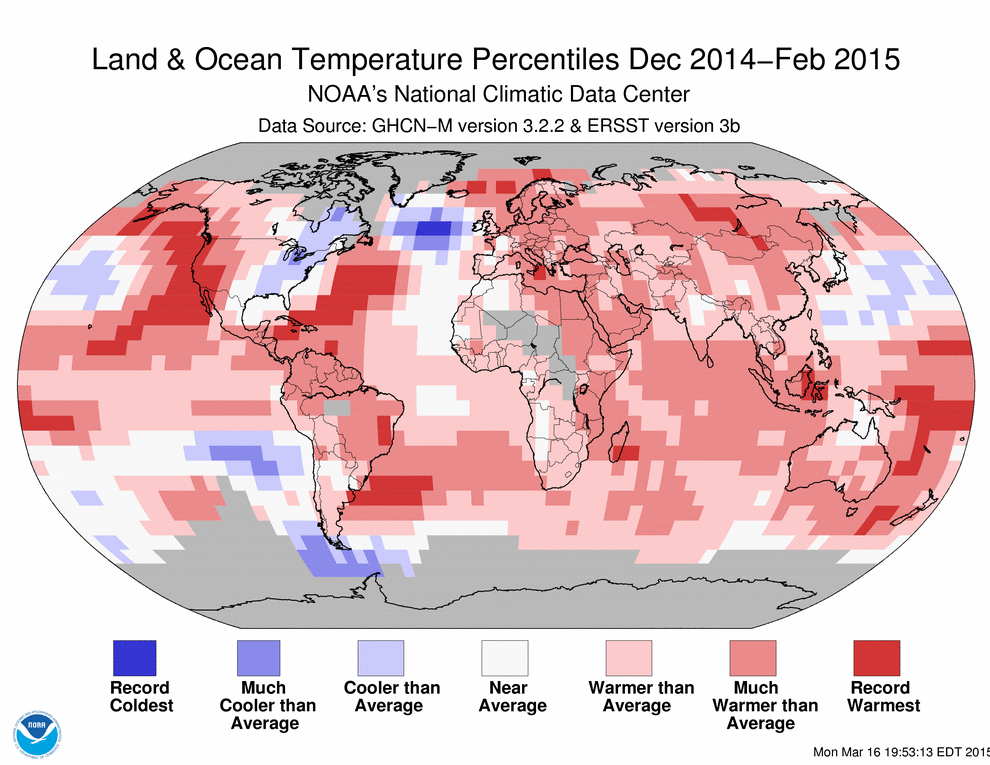British citizens go to the polls (or, as they say, Parliament goes to the country) the day after tomorrow. At the moment, neither the ruling Conservative party nor the opposition Labour party is predicted to win the 323 seats (out of 660) necessary to form a government. Most forecasts give Labor 267 seats to the Tories' 281, which means that once again they will need to form a coalition government.
The Economist has a tool to illustrate the problem facing the two major parties. With the UK Independence Party (similar to the Tea Party, but without the grace, subtlety, or Christianity) and Democaratic Unionists (Northern Irish protestants) supporting the Tories and the Greens, Welsh, and Northern Irish Catholic parties supporting Labour, the count is still only 275 to 290 in favor of the Tories.
The likely outcome will be the Scottish National Party and its 51 seats forming up with Labour. The Liberal Democrats 26 seats won't be enough to do it—but they will almost certainly join the government no matter who forms it.
This, then, is the likely outcome Thursday:

That looks great for Ed Miliband, except for the SNP. This is simply because the SNP's raison d'être is Scottish independence. Stay tuned...
To read:
Back to cleaning up after a production bug this weekend.
Chip-and-PIN cards have ruled Europe for almost 10 years, because (a) they reduce fraud that (b) customers are liable for over there. In the U.S., where banks are liable, consumers haven't pushed as hard for the security measure, so it's rare. I've had a chipped card for two years now but even my bank hasn't gone the whole way to requiring PINs for purchases with it.
Chase, however, has had enough, and has decided to issue them to everyone:
Chip cards have significantly cut into fraud globally. For example, in the United Kingdom, card fraud in stores dropped by 75 percent from 2004 — when a large-scale rollout began — to 2012, said Zilvinas Bareisis, a senior analyst for Celent, a consulting firm to the financial services industry.
A December 2014 report by the Payments Security Task Force, whose members include Visa, Bank of America and Riverwoods-based Discover, estimates that 47 percent of U.S. terminals will accept chip cards by the end of 2015.
Chase, which holds almost 25 percent of deposits in the Chicago area, said its rollout here will be followed nationally.
Other banks are slowly introducing chip cards. BMO Harris Bank, which holds 12 percent of deposits in the Chicago area, said it recently began issuing chip debit cards. Any new or replacement debit cards include chips, spokesman Patrick O'Herlihy said.
It's sometimes amusing and sometimes sad that the U.S. lags the rest of the OECD in technology. This one is sad. I'm glad Chase is making this push. We could finally have chip-and-PIN cards in time for Europe to roll out whatever comes next.
My to-do list today only has 14 items on it, of which 6 are checked off already. The actual time it will take to accomplish the remaining eight items varies between 20 minutes (laundry, tonight, essentially a fire-and-forget activity) and four hours (Staging release of the Holden Adaptive Platform).
So, once again, I'm going to shove a bunch of articles to my Kindle:
Now to do the next few things on my list...and watch the thunderstorm outside my office window.
Well, this surprised me this morning:
Surprising critics and supporters alike, Arkansas governor Asa Hutchinson (R) announced today he plans to veto the religious freedom bill passed yesterday by the state legislature. The bill in Arkansas is similar to an Indiana law passed last week, with both diverging in certain respects from the federal Religious Freedom Restoration Act. That act was passed in 1993 and signed into law by President Bill Clinton, Arkansas’s most famous political son.
Both bills allow for larger corporations, if they are substantially owned by members with strong religious convictions, to claim that a ruling or mandate violates their religious faith, something reserved for individuals or family businesses in other versions of the law. Both allow religious parties to go to court to head off a “likely” state action that they fear will impinge on their beliefs, even if it has not yet happened.
Citing concerns that the language of the Arkansas bill could allow companies to discriminate against people because of their sexual orientation, Hutchinson said he realized the bill "wasn't really about religious freedom."
"Clearly this is an effort of a small group of small-minded people to enforce their narrow religious beliefs on society as a whole," Hutchinson said at a press conference at the governor's mansion. "It's exactly the kind of thing that makes people think Republicans are trying to drag the country back to the 19th Century."
"Look, we're the party of Lincoln, Teddy Roosevelt, and Dwight Eisenhower, men of great vision and talent who worked hard to protect Americans of all stripes. It demeans us to keep passing this kind of divisive, negative legislation that has no purpose other than to express the outrage some religious bigots feel that the world has moved on from their medieval world-view," Hutchinson said.
"I'm a God-fearing Christian, but if I sign this law, I'm no better than those Taliban idiots who really believe the 11th Century was a better time. Giving in to this gay-baiting crap isn't in line with what Jesus taught us, and that it was sent to me during Holy Week just underscores how petty and bigoted some people in the Arkansas legislature really are," Hutchinson said.
"It's time for real leadership in this state so we can get out of 45th place in education, 45th place in poverty, and 48th place in per-capita GDP. It's embarrassing. As governor, I'm not going to stand for this bread-and-circuses nonsense when there's real work to be done," Hutchinson said.
In other news, Britain's University of Leicester will be changing its name to King Richard University, according to the Independent. According to the newspaper, "The proposal will be debated by the university’s senate next month. It is expected to agree to the institution formally being rechristened as King Richard University from September 2016."
My catching-up on the Netflix version of Michael Dobbs' House of Cards has taken a brief hiatus as the friend in question has actual work and family obligations. I'm taking advantage of the pause to go back to the original BBC miniseries with Ian Richardson in the role of F.U.
You know what? It'ts better. It has a faster pace, more sharply-drawn characters, it's funnier, and it isn't sanctimonius—it's an actual satire. Francis Urquhart is evil, and doesn't care that we in the audience know it. Francis Underwood wants us to like him. That may be the difference between the UK and the US in a nutshell.
Still, in three hours of the BBC miniseries, I find myself laughing out loud at Urquhart's deviousness and at the lampooning of British political archetypes (that, granted, require some context about British politics post-Thatcher). The Netflix series just seems so...sanctimonious. Melodramatic. Long.
The British understand satire. Americans, not so much. Comparing the two versions of House of Cards side by side has been an education.
Under international treaties, German flag carrier Lufthansa could face huge compensation claims after one of its pilots apparently intentionally crashed an A320 into the Alps on Tuesday:
Under a treaty governing deaths and injuries aboard international flights, airlines are required to compensate relatives of victims for proven damages of up to a limit currently set at about $157,000 — regardless of what caused the crash.
To avoid liability, a carrier has to prove that the crash wasn't due to "negligence or other wrongful act" by its employees, according to Article 21 of the 1999 Montreal Convention.
That would be a difficult argument to make when a pilot intentionally crashes a plane into a mountain, and one that Lufthansa would likely avoid as it could further damage the brand, [German aviation lawyer Marco] Abate said.
Abate said that in German courts, damages for pain and suffering typically don't exceed 10,000 euros ($11,000). However, Lufthansa could face much bigger claims for loss of financial support. If the breadwinner of a family was killed in a plane crash, the survivors can sue for years of lost income, Abate said.
The difference between U.S. and European procedures might be a problem for Lufthansa. In the U.S., pilots are never left alone in the cockpit; in Europe—at least until this week—there was no comparable practice.
Things I will read or explore more this weekend:
Must run.
The National Aeronautical and Atmospheric Administration (NOAA) reported today that the climatalogical winter of December 2014 through February 2015 was the warmest on record, despite what happened in the eastern United States and Canada:
During December–February, the average temperature across global land and ocean surfaces was 1.42°F (0.79°C) above the 20th century average. This was the highest for December–February in the 1880–2015 record, surpassing the previous record of 2007 by 0.05°F (0.03°C).
During December–February, the globally-averaged land surface temperature was 2.63°F (1.46°C) above the 20th century average. This tied with 2007 as the highest for December–February in the 1880–2015 record.
Even with record cold from Maine to Alabama, it was the 19th warmest winter in the Lower 48—in part because five states in the west experienced record heat and six more got into the 90th percentile.

Anthropogenic climate change may have permanently destabilized both the West and East Antarctic Ice Sheets, meaning the planet could experience 3.3 to 4.3 meter sea-level rises in the next few centuries. And even better, gravity will push more towards North America than towards anyplace else:
In the event of a collapse of the West Antarctic ice sheet, scientists have determined that the United States will receive moresea level rise than almost any other part of the world. (Granted, so will other countries in North America, like Canada and Mexico, which have considerably less global warming responsibility.)
In this case, West Antarctica is so large that it pulls the global ocean toward it, which slopes upward toward the ice sheet and the Antarctic continent in general. But if West Antarctica were to lose a substantial part of its ice, then the gravitational pull would relax, and sea level would actually decrease near the ice sheet even as it spreads and increases across the global ocean.
But not evenly. Instead, areas farther from West Antarctica would get more sea level rise, and North America and the United States might get more than any other inhabited place on Earth. “The water that had been held close to West Antarctica spreads out across the ocean,” explains Penn State glaciologist Richard Alley, “and we’re far enough away that we weren’t in the ‘pile’ that was held close to West Antarctica when the ice sheet was there and its gravity attracted the water to make the pile, but we get our share of the water from that pile when it spreads out.”
So possibly, a couple centuries from now, there will be an enormous dam protecting the Long Island Sound from the Atlantic, and Florida will be an artificial island somewhere near Miami. Good work, humans.